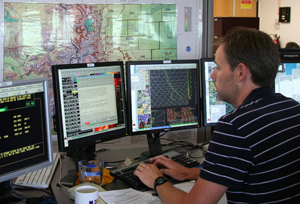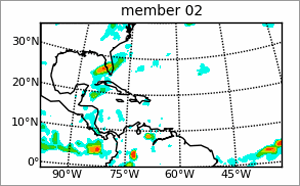
|
|

Click image to see full view of this ensemble precipitation forecast incorporating EnKF
|
Contact: Jeff Whitaker
|
PSL Helps Improve Data Assimilation for Global Weather Prediction
May 31, 2012
On 22 May 2012, the Environmental Modeling Center (EMC) at the National Weather Service's (NWS) Center for Environmental Prediction (NCEP) changed their global atmospheric data assimilation system from a purely variational system to a hybrid system, which incorporates an ensemble Kalman filter (EnKF) to provide a statistical estimate of the "forecast error of the day". The EnKF portion of the system was developed and tested by Physical Sciences Division (PSL) staff at the Earth System Research Laboratories (ESRL) in Boulder, CO in an effort led by Drs. Jeff Whitaker and Tom Hamill. The ESRL/PSL team has worked closely with NCEP in integrating the EnKF algorithm with the existing operational variational data assimilation system (known as Global Statistical Interpolation, or GSI), ultimately leading the implementation of the hybrid GSI/EnKF system. This change will result in improvements to global weather forecasts, including high-impact events such as hurricane track forecasts.
The process of generating a numerical weather forecast begins by estimating the current state of the atmosphere. The more accurate the estimate of the current state, the more accurate the forecast may be. Two pieces of information are blended together to estimate the current state. The first is the weather observations from the past few hours, including satellite data, aircraft data, radars, and weather balloons. The second is a prior "first guess" estimate of the current state, usually supplied by a short-range model forecast. In the previous operational GSI system, the relative weighting given to new observations and the first-guess forecast was essentially constant in time. In the new hybrid GSI/EnKF system, the weighting is estimated dynamically from the EnKF, and can change with the weather situation. This allows the observations to make a larger correction in situations where the first-guess forecast is likely to be less accurate (such as in a rapidly developing hurricane).
This project is notable not only for the improvements that can be expected in the global forecast system but also as an example of an effective collaboration between ESRL/PSL and NWS scientists. ESRL/PSL scientists provided the early development, refinement, and testing of the algorithm, taking it from unproven cutting-edge research to a viable candidate for operational NWS use. Key to the success of this project was the development of an effective partnership with the data assimilation team at NCEP/EMC (led by John Derber) to merge this technology with the operational GSI data assimilation system. Collaborations between ESRL/PSL and NCEP/EMC are ongoing, and will result in further improvements to data assimilation and ensemble forecast methods in the coming years.